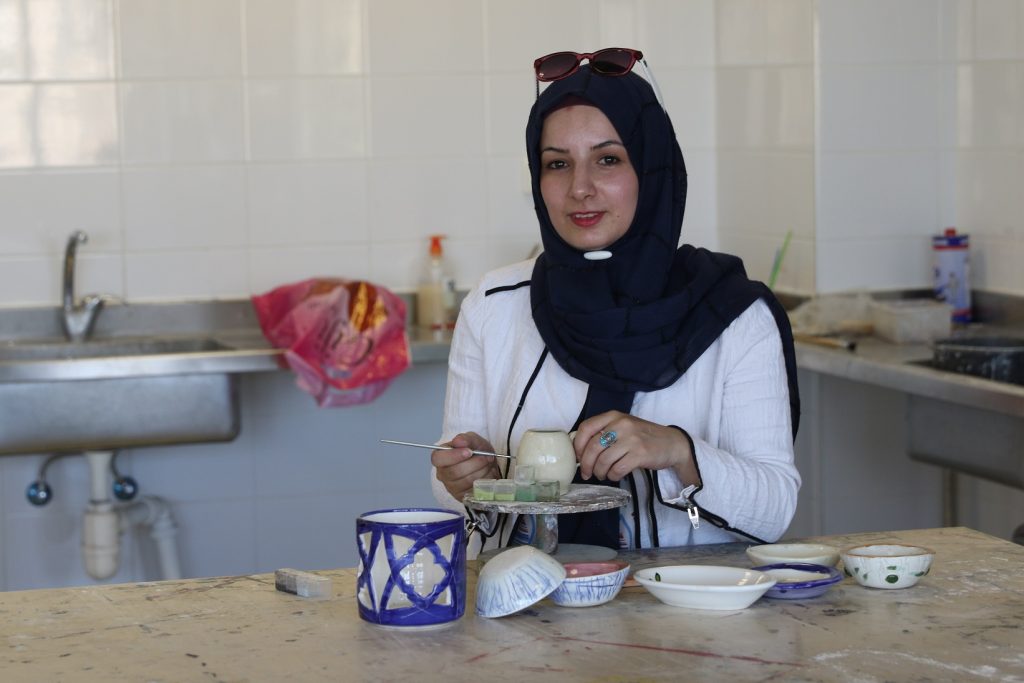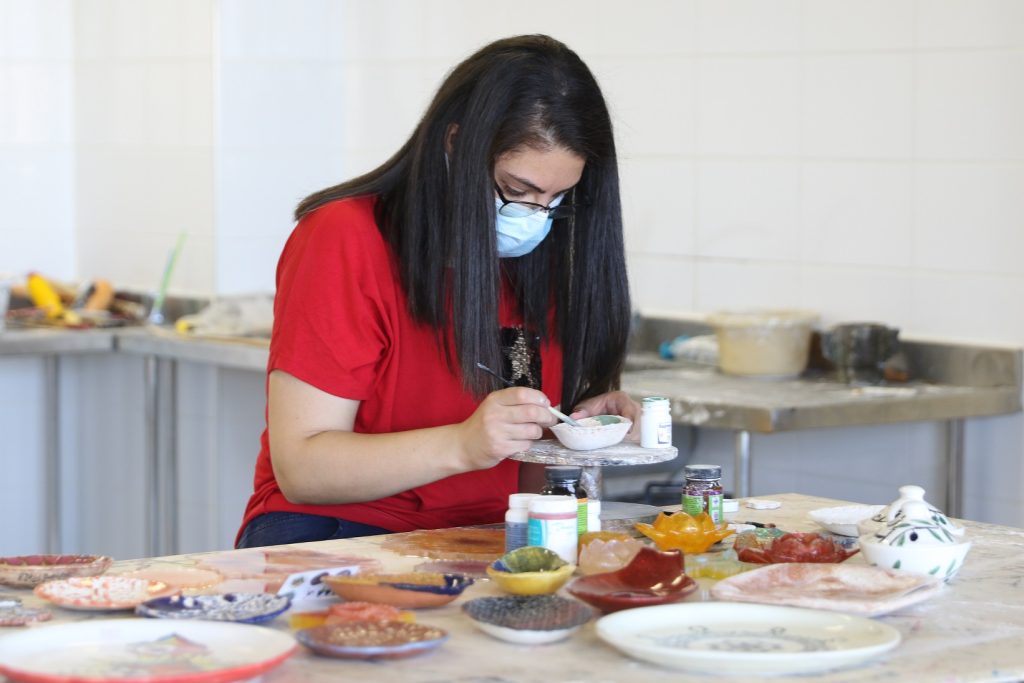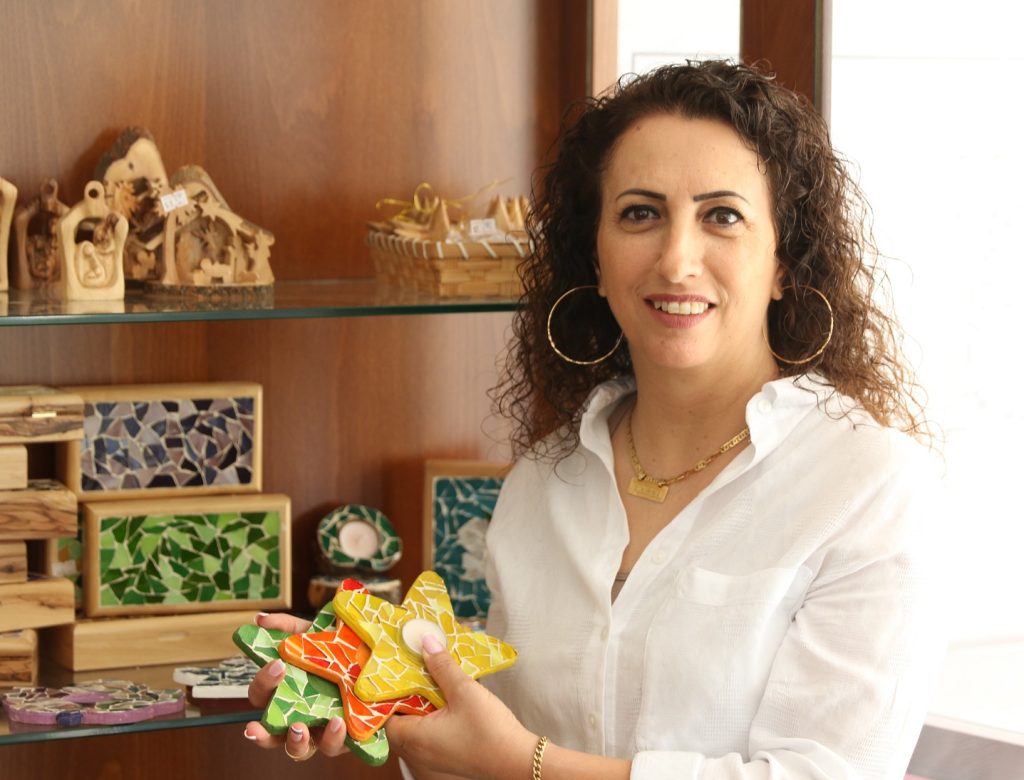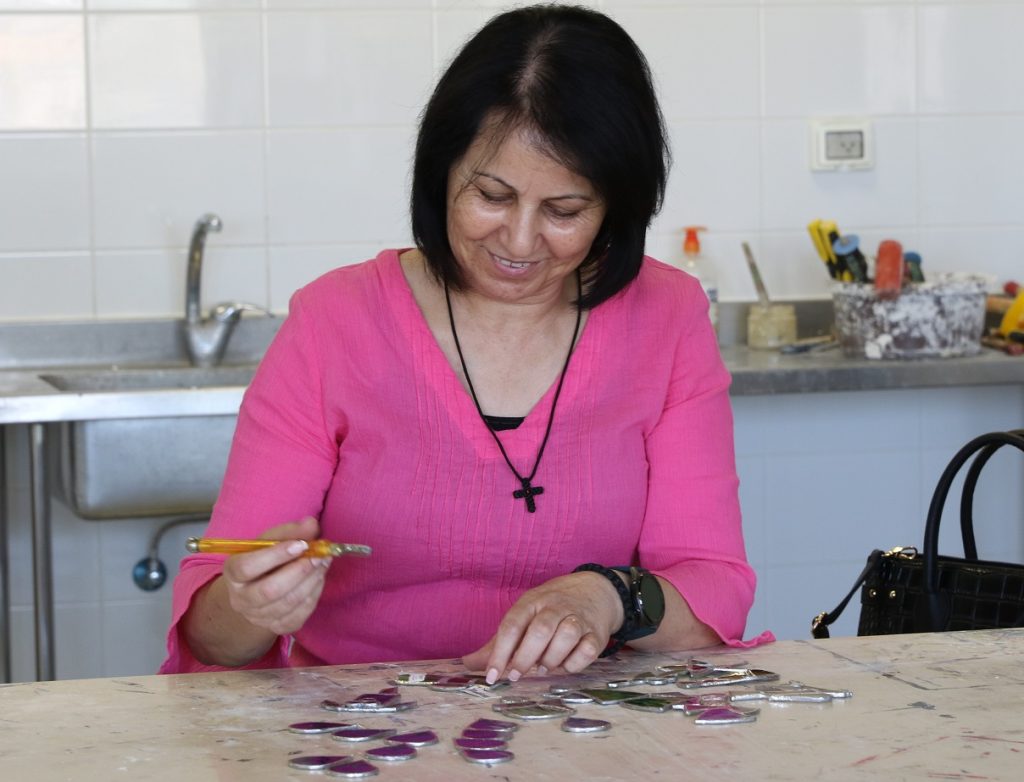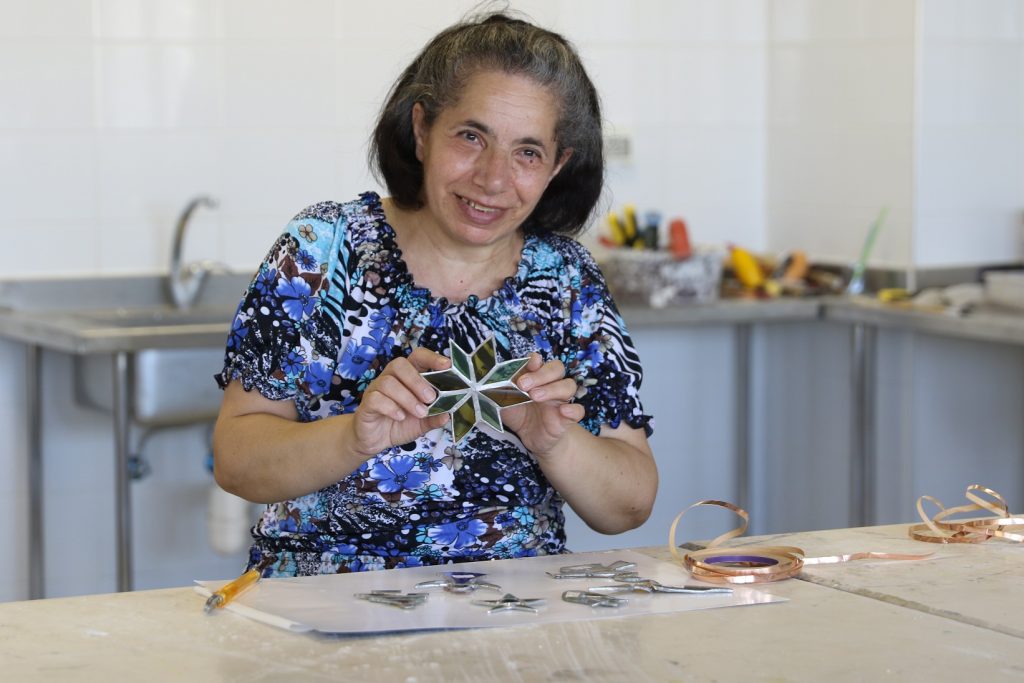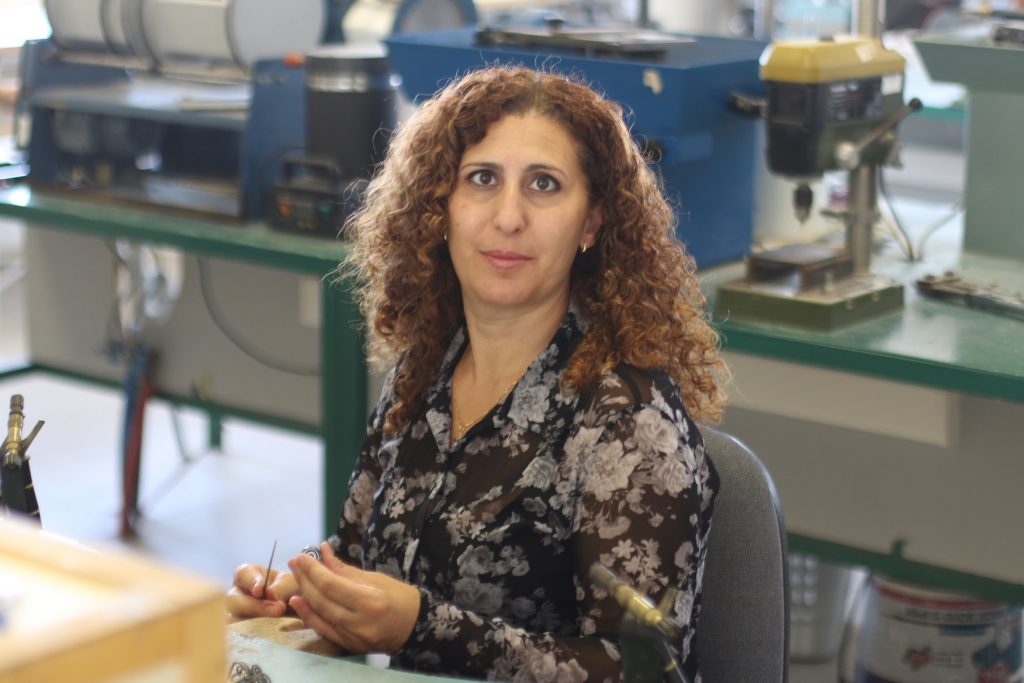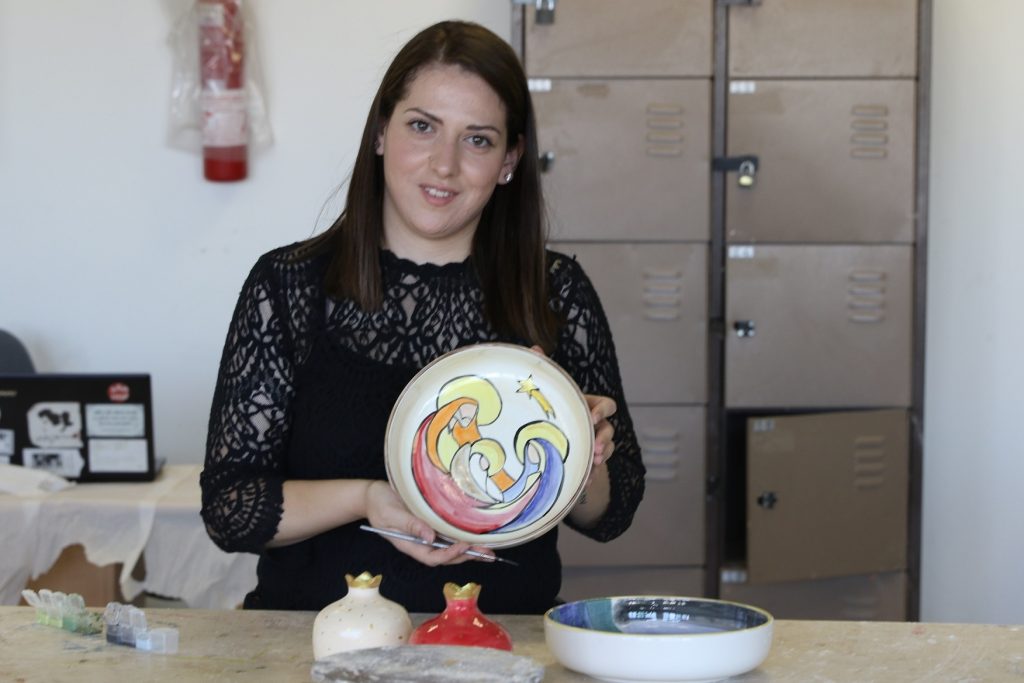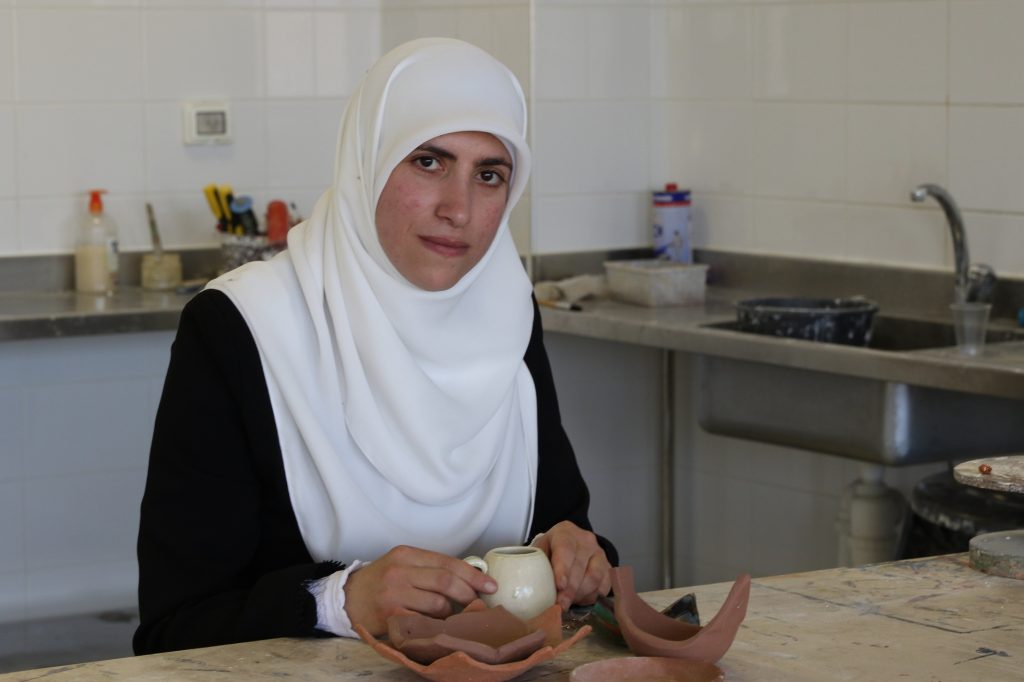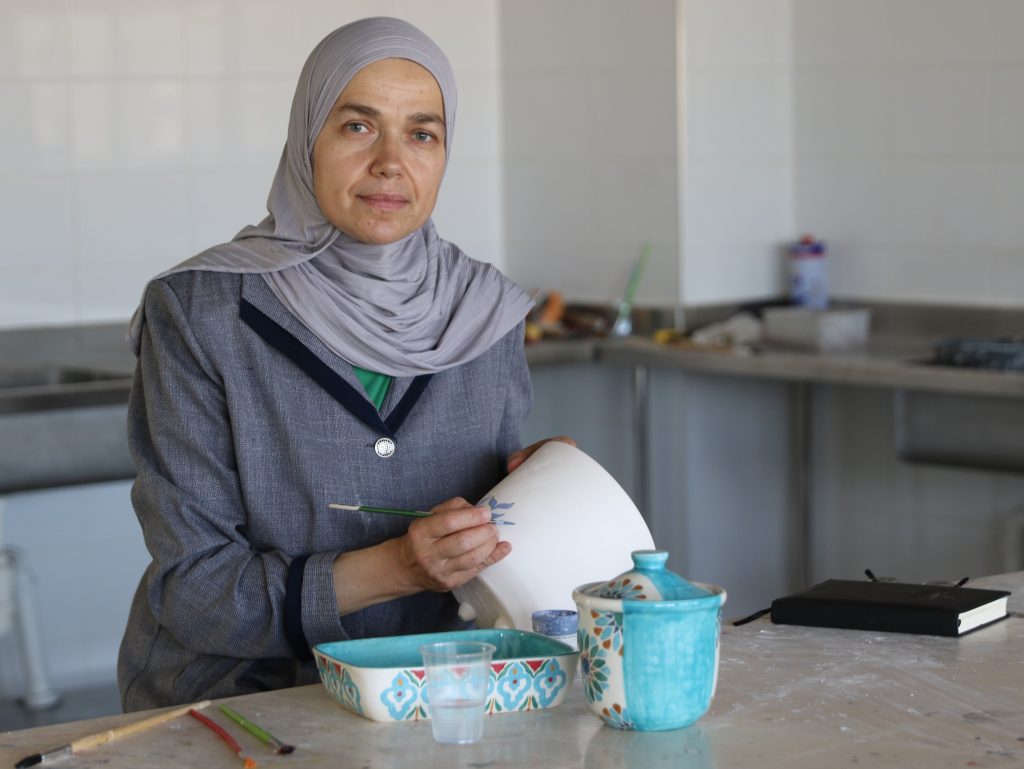Sawsan Rishmawi (سوسن رشماوي)
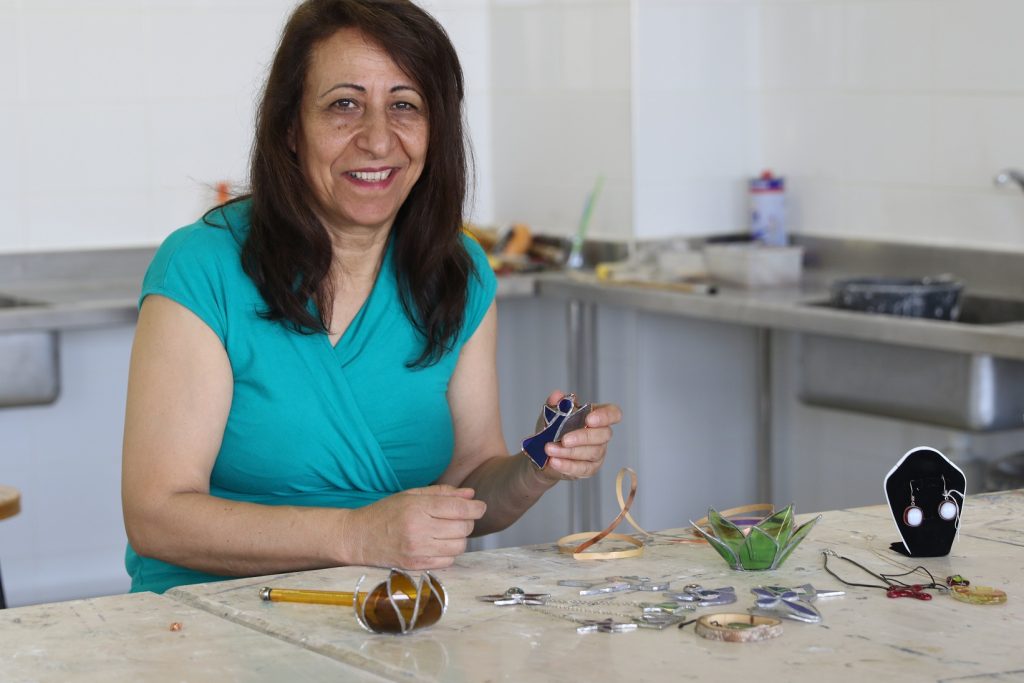
Sawsan Rishmawi
Sawsan Rishmawi from Beit Sahour began her career by joining the artistic courses organized by the International Center of Bethlehem – Dar Annadwa at the beginning of the second millennium. She was one of the first staff members recruited by Dar Annadwa to conduct field research and questionnaires in local schools and universities to study the feasibility of establishing Dar al-Kalima College.
Sawsan masters crafting stained glass; she makes ornaments to decorate Christmas trees and candle holders. She practices her handicrafts in her small home workshop, where she has the essential equipment.
Her great passion for art encouraged her to participate in several artistic training courses in crafting glass, ceramics, silvers and olive wood in Bethlehem, Ramallah and other Palestinian cities.
Sawsan regularly participates in festival bazaars and local markets, especially Christmas markets in Bethlehem and Nazareth. She has also participated in various exhibitions in Italy.
With more than 20 years of professional experience, Sawsan has established her notable style. She has distinguished herself by crafting olive wood and leaves and integrating them with glass to create souvenir products. She confirms that most of her handmade products target tourists and foreigners, which prompted her to focus on Christian religious symbols in particular due to the high demand from tourists visiting Palestine in this regard. Sawsan added: “I feel that local customers are not interested in these products; therefore, I am always looking for new marketing ways to reach foreign customers”.
Sawsan took courses in digital marketing organized by Business Women Forum; she manages her Facebook business page: Shepherds Handicrafts.
However, she could not increase her sales rate and hopes to develop her page in the future, which she considers a powerful tool to promote her work as an artisan.
Sawsan considers ongoing and random experimentation as her strong point. She believes that what distinguishes a handmade product from one manufactured using machinery is the unique crafting method that makes a handmade piece look different from another. Therefore, she always seeks to give each piece a unique character through innovative colours, shaping and other designing and crafting techniques.
One of her most significant artworks was the famous Last Supper, which she designed using glass mosaic and managed to sell at an art exhibition in the United States.
Sawsan is looking forward to producing artwork in large sizes. This would enable her to participate in international exhibitions and thus achieve higher financial profits.
سوسن رشماوي
بدأت سوسن رشماوي من بيت ساحور مسيرتها الفنيّة بانضمامها للدّورات التي كانت تنظّمها دار النّدوة الدّولية مطلع الألفيّة الثّانية. وكانت من أعضاء الطّاقم الأول الذي جنّدته دار النّدوة للقيام ببحثٍ ميداني واستبيانات في المدارس والجامعات المحلّية لدراسة جدوى تأسيس مشروع كلّية دار الكلمة.
تتقن سوسن ممارسة عدّة حرف يدوية كتشكيل الزّجاج المقشّع وتصنيع زينة لشجرة عيد الميلاد وقواعد للشّمع، وتقوم بتصنيع منتجاتها في مشغلها المنزلي حيث تمتلك المعدّات الأساسية مثل فرن صهر الزجاج.
شغفها الكبير في الفن دفعها للمشاركة في عدّة دورات في مجالات الحرف اليدوية مثل الزّجاج والخزف والفضّة والنّحاس وخشب الزيتون في بيت لحم ورام الله ومدن فلسطينية أخرى.
تشارك سوسن باستمرار في المهرجانات والأسواق المحلّية وكان لها عدّة مشاركات في مدن في الدّاخل المحتل مثل الناصرة خلال موسم عيد الميلاد، وشاركت أيضاً في معارض مختلفة في إيطاليا.
من خبرتها العمليّة التي تفوق العشرين عاماً، شكّلت سوسن أسلوبها الخاص والذي تميّزت فيه كتشكيل خشب وورق شجر الزيتون ودمجه مع الزجاج كأحد أشكال التّحف الشّرقية، وتؤكد أنّ معظم منتجاتها اليدوية موجّهة للسيّاح والأجانب ممّا دفعها للتّركيز على الرّموز الدّينية المسيحيّة بشكلٍ خاص لما في هذا المجال من طلبٍ عالٍ من السّياح الزّائرين لفلسطين. أضافت سوسن: ” أشعر أن المواطن المحلّي لا يرغب باقتناء هذه المنتجات، وعليه أبحث دوماً عن طرق تسويق جديدة للأجانب”.
شاركت في دورات متخصّصة في التّسويق الإلكتروني مع منتدى سيّدات الأعمال، وتدير صفحتها التّجارية على موقع الفيسبوك بشكل شخصي تحت اسم: Shepherds Handicrafts
بالرّغم من ذلك، لم تتمكن من تحقيق نسبة مبيعات عالية وتطمح لتطوير صفحتها الخاصة التي تعتبرها أسلوباً ترويجياً لعملها كفنانة حرفية ولمنتجاتها.
ترى سوسن نقطة قوّتها في التجريب المستمر والعشوائية، وتعتقد أنّ ما يميّز القطع المشغولة يدوياً عن القطع المصنعة باستخدام ماكينات كبيرة هو ذلك التّفرد في طريقة التنفيذ اليدوي والتي تجعل كل قطعة تبدو مختلفة عن الأخرى. وعليه، تسعى دوماً إلى إعطاء خصوصيّة لكل قطعة من خلال التّجديد في الألوان وطريقة التشكيل وغيرها من تقنيّات التّصنيع وتعتقد أنها بهذه الطريقة تجذب الزبائن بشكلٍ أكبر.
من أهم الأعمال الفنية التي أنجزتها هي لوحة العشاء الأخير والتي صمّمتها باستخدام أسلوب الفسيفساء الزّجاجي وتمكّنت من بيعها في أحد المعارض في الولايات المتحدة.
تطمح سوسن إلى تكبير رأس مالها لتتمكّن من تنفيذ أعمال فنية بأحجام كبيرة تمكّنها من المشاركة في معارض دوليّة وبالتّالي تحقّق لها عائد مادي أكبر.

